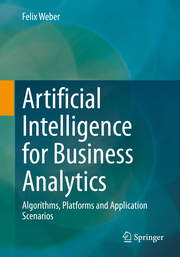Detailansicht
Artificial Intelligence for Business Analytics
Algorithms, Platforms and Application Scenarios
ISBN/EAN: 9783658375980
Umbreit-Nr.: 5380983
Sprache:
Englisch
Umfang: XI, 136 S., 5 s/w Illustr., 33 farbige Illustr.
Format in cm: 1 x 24 x 17
Einband:
kartoniertes Buch
Erschienen am 02.03.2023
Auflage: 1/2023
- Zusatztext
- While methods of artificial intelligence (AI) were until a few years ago exclusively a topic of scientific discussions, today they are increasingly finding their way into products of everyday life. At the same time, the amount of data produced and available is growing due to increasing digitalization, the integration of digital measurement and control systems, and automatic exchange between devices (Internet of Things). In the future, the use of business intelligence (BI) and a look into the past will no longer be sufficient for most companies.Instead, business analytics, i.e., predictive and predictive analyses and automated decisions, will be needed to stay competitive in the future. The use of growing amounts of data is a significant challenge and one of the most important areas of data analysis is represented by artificial intelligence methods.This book provides a concise introduction to the essential aspects of using artificial intelligence methods for business analytics, presents machine learning and the most important algorithms in a comprehensible form using the business analytics technology framework, and shows application scenarios from various industries. In addition, it provides the Business Analytics Model for Artificial Intelligence, a reference procedure model for structuring BA and AI projects in the company. This book is a translation of the original German 1st edition Künstliche Intelligenz für Business Analytics by Felix Weber, published by Springer Fachmedien Wiesbaden GmbH, part of Springer Nature in 2020. The translation was done with the help of artificial intelligence (machine translation by the service DeepL.com). A subsequent human revision was done primarily in terms of content, so that the book will read stylistically differently from a conventional translation. Springer Nature works continuously to further the development of tools for the production of books and on the related technologies to support the authors.
- Kurztext
- While methods of artificial intelligence (AI) were until a few years ago exclusively a topic of scientific discussions, today they are increasingly finding their way into products of everyday life. At the same time, the amount of data produced and available is growing due to increasing digitization, the integration of digital measurement and control systems, and automatic exchange between devices (Internet of Things). In the future, the use of business intelligence (BI) and a look into the past will no longer be sufficient for most companies. Instead, business analytics, i.e., predictive and predictive analyses and automated decisions, will be needed to stay competitive in the future. The use of growing amounts of data is a significant challenge and one of the most important areas of data analysis is represented by artificial intelligence methods.This book provides a concise introduction to the essential aspects of using artificial intelligence methods for business analytics, presents machine learning and the most important algorithms in a comprehensible form based on the business analytics technology framework, and shows application scenarios from various industries. In addition, it provides the Business Analytics Model for Artificial Intelligence, a reference procedure model for structuring BA and AI projects in the company. The Content Business Analytics Artificial Intelligence AI and BA platforms Technology framework and procedure model as reference Case studies on the use of AIbased business analytics The AuthorFelix Weber is a researcher at the University of Duisburg-Essen with a focus on digitalization, artificial intelligence, price, promotion, assortment management, and transformation management. At the Chair of Business Informatics and Integrated Information Systems, he founded the Retail Artificial Intelligence Lab (retAIL). At the same time, he also worked on various jobs as a consultant for SAP systems in retail, Head of Data Science and as Head of ERP. He thus combines current practice with scientific research in this subfield. This book is a translation of an original German edition. The translation was done with the help of artificial intelligence (machine translation by the service DeepL.com). A subsequent human revision was done primarily in terms of content, so that the book will read stylistically differently from a conventional translation.
- Autorenportrait
- Felix Weber is a scientist at the University of Duisburg-Essen with a research focus on digitalization, artificial intelligence, price, promotion and assortment management, and transformation management. At the Chair of Information Systems and Integrated Information Systems, he is the founder of the Retail Artificial Intelligence Lab (retAIL) and at the same time a senior consultant for SAP systems in wholesale and retail. He thus combines current practice with scientific research in this subfield.
